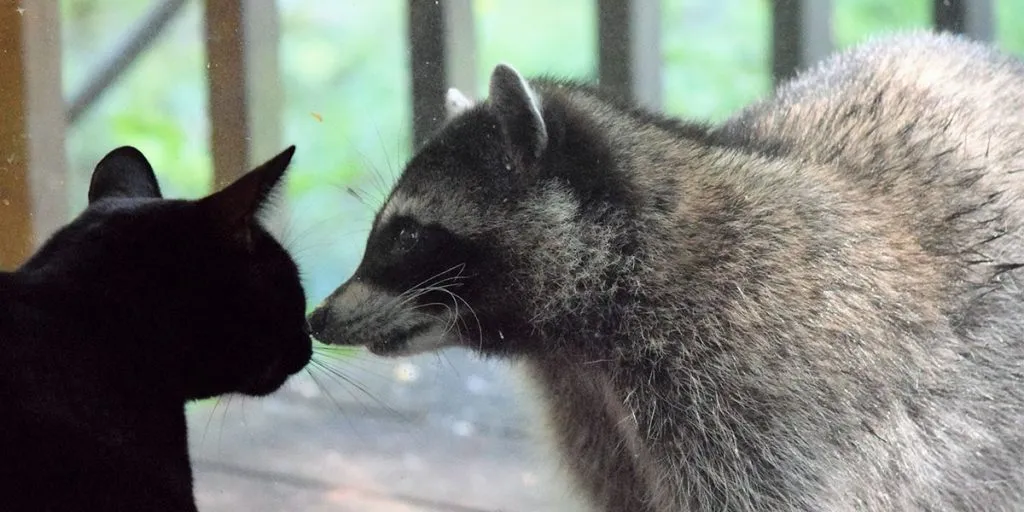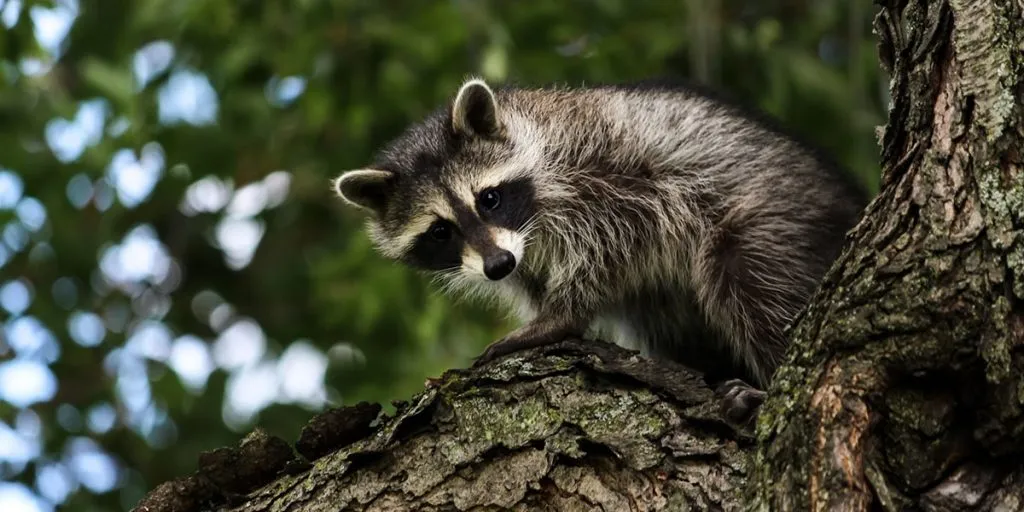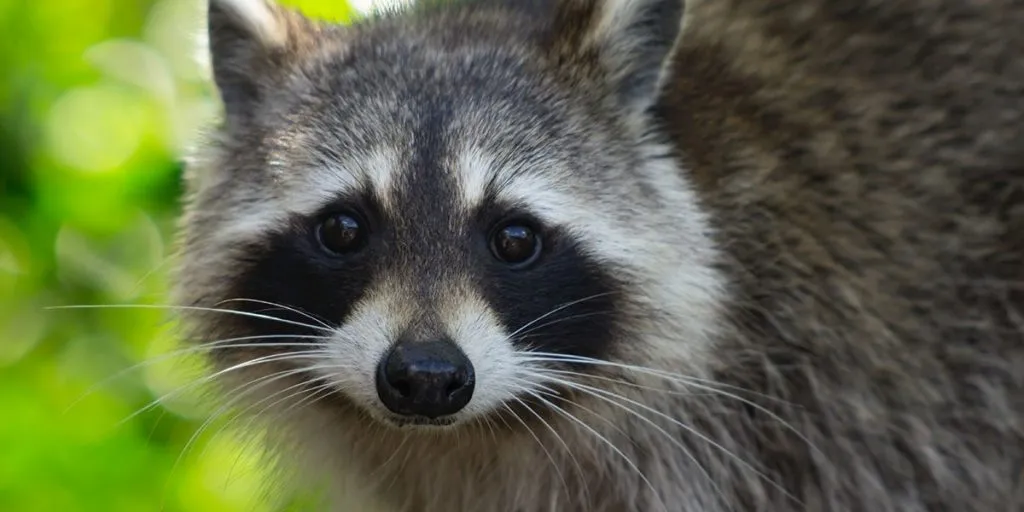Generally, raccoons are not aggressive towards domesticated house cats. However, cats can respond aggressively towards the presence of a raccoon for multiple reasons.
While unlikely, a wild raccoon is definitely able to kill a cat in a fight. Aggressive behavior between a cat and raccoon is generally caused by a dispute over food, or territorial behavior. If a raccoon kills a cat, it will eat the cat if given the opportunity.
In the case of a raccoon, it is likely going to be the instinctive behavior of the cat that sparks a conflict between the two animals. Cats that are possessive of food and fed outside are at risk the most. The YouTube video below shows how food can be a deciding factor in a raccoon vs. cat fight:
Are Raccoons A Danger To Cats?
Raccoons will be a danger to cats when disputes over food or territory emerge. As with all wild animals, raccoons are unpredictable in their behavior and can act dangerously aggressive towards a cat. Most cats will avoid serious danger by fleeing, but some will stand their ground and fight.
When a cat gets into a fight with a raccoon, it is usually the raccoon that wins. Raccoons have the ability to kill cats with their sharp claws, whereas the smaller claws of a cat will usually not do much damage.
That said, a raccoon is quite intelligent and will avoid conflict where possible. Only when it decides to steal food from a housecat, the response can be less than optimal. But even the very presence of a ‘trash panda’ in your backyard can be dangerous. Some cats will go very far to protect any pets or humans it considers part of their social group.
Would A Raccoon Eat A Cat?
If given the opportunity, a raccoon would eat cat meat. Raccoons are opportunistic eaters and will eat any type of available meat, including a deceased house cat. Raccoons will not only eat deceased cats, but will also attack and kill cats under specific circumstances.
That said, it is not common for a raccoon to hunt down domestic house cats for food. Only when food is really scarce, they might attempt to kill a kitten and eat it. However, they will prefer to eat other small animals (such as mice, rats, or birds).
A raccoon is not a meat-eating hunter by default, it is more of a scavenger. However, it doesn’t shy away from eating the dead remains of an animal. Nor will it pass up the opportunity to kill a weakened or small animal. This includes small critters that might roam around the house, including your kittens or adult cats.
Prevent Conflict Between Raccoons And Cats
For owners of cats, it is advisable to take measures against raccoon attacks. To prevent conflict between your cats and wild animals roaming around your property, follow these practical tips:
- Don’t feed your cats outside: Raccoons love to eat cat food. If this is openly available in your backyard, it is inevitably going to attract raccoons looking for a meal. Feeding cats outside can be a major catalyst for conflict, especially when raccoons mingle with cats in order to quickly steal some cat food.
- Lock your trash cans: There is a reason that a raccoon is jokingly called a ‘trash panda’. If your trash is exposed and some food is left in one of the bags, a raccoon will keep coming back in search of food. If you take away the access to their food sources, there won’t be any raccoons to worry about.
- Block off any hiding spots: Don’t let raccoons sleep or rest on your property when cats are around. Block off raccoon access to trees, fence off your vents, chimneys, and crawl spaces. Regularly check under a backyard deck to see if any raccoons are hiding there.
- Discourage raccoons with smell: Raccoons hate specific smells for various reasons. A good scent repellent to spray around the backyard is cougar urine, as it is one of many natural raccoon predators. However, please note that outdoor cats might spray over the urine smell to mark their territory.
- Keep vulnerable cats indoors: Opportunistic predators are dangerous to vulnerable cats. Especially when raccoons are known to roam your property, keep any cats that can’t fend for themselves indoors. Especially in the winter, when food in the wild is scarce. Raccoons do not hibernate, but sleep for prolonged periods of time. After waking up, their hunger can cause them to be a danger to any cat, but especially to vulnerable individuals.
What To Do When A Raccoon Attacks
If a raccoon is being aggressive towards your pets, there are several things you can to do break up a fight. Here are some of the things you can do when a raccoon attacks your cat, dog, chickens, or rabbits:
- Spray water: Get a water hose, a bucket of water, a pressure washer, a super soaker, or any other water propelling tool. Threaten to spray the raccoon first, then aim for its body. If that doesn’t help, spray him in the face.
- Make loud noises: Shout, clap, slam a flowerpot or lawn chair, whatever makes noise in your direct vicinity will work to scare off the raccoons attacking your pets.
- Throw non-lethal objects: If the ‘cute approach’ doesn’t work to break up a vicious fight between the animals, it’s time to get serious. We don’t want to harm your cat or other pet, so it’s best to throw objects that don’t hurt, but only scare them. Examples could be tennis balls, sticks, or an outdoor toy from a kid.
- Release your dogs: In the extreme case that nothing works, it’s time to unleash the hounds (if you have any). Dogs will see other pets as part of their pack and will do anything to protect them. This includes breaking up an animal fight with the appropriate level of force.
- Get help from other people: Imagine you’re a raccoon and you see multiple people running in your direction, while you’re attempting to kill a cat. What would you do? You would flee in an instant. So if you don’t have a dog, get a few people, run towards the fight, and make noise!
How To Tell What Animal Killed Your Cat
If you find a wounded or killed cat in your backyard, it is likely that it was attacked by another animal. Animals that kill but don’t eat cats are likely to be foxes, as they see cats as competition. Raccoons will sometimes kill a cat, but will also often attempt to eat it.
Identifying what wild animal keeps killing your cats can be difficult. Here are some things you should look out for:
- Bite marks: What type of wounds does the cat have on its body? How big are the bite marks, and where was the cat bitten? Coyotes and foxes will bite cats in the neck, while raccoons will usually claw at their face and body.
- Scat: Are there any wild animal droppings nearby that could identify the killer? Here is an identification guide.
- Hairs: Are there any identifiable hairs around that might not come from your cat? Also, check the bushes around where the fight took place.
- Tracks: Are any identifiable predator footsteps in the area around the fight? Make a picture if you find any, here is an identification guide.
If you are unsure about the events that led to the attack on your injured or deceased cat, the best thing to do is gather evidence. It is unlikely that a raccoon killed the cat, but don’t rule out any possibilities. It could have been a wild big cat, hawk, or coyote as well.
To find out what predator ate or killed your cat, take pictures of the wounds and any indicators mentioned above. Take them to your local vet, pest control company, or wildlife expert for further advice.



